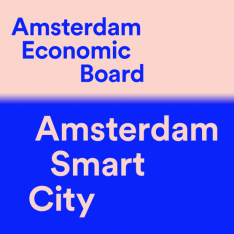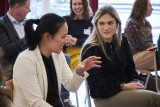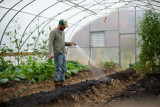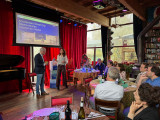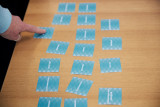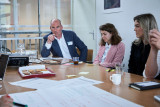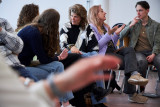Als Amsterdam Smart City netwerk bijten we ons vast in complexe stedelijke transitievraagstukken. Ze zijn complex omdat doorbraken nodig zijn; van kleine doorbraakjes, tot grotere systeem doorbraken. Denk aan bewegingen rond; organisatie-overstijgend werken, domein-overstijgend werken, en van competitief naar coöperatief. Als netwerk zetten we samenwerkingsprojecten op waarin we gaandeweg ondervinden met wat voor barrières we te maken hebben en wat voor doorbraken er nodig zijn.
Tijdens ons jaarlijkse Partnerdiner op 2 april, hadden we het samen met eindverantwoordelijken van onze partnerorganisaties over de strategische dilemma’s die spelen bij transitievraagstukken. Als gespreksstarters gebruikten we onze lopende onderwerpen van 2024: De coöperatieve metropool, de ondergrond, de circulaire metropool en drijvende wijken. De gesprekken aan tafel gingen echter over wat er aan de basis staat van het werken aan transitievraagstukken. Zo ging het bijvoorbeeld over; het samenwerken aan visies en scenario’s, leiderschap, burgerlijke ongehoorzaamheid en de kracht van coöperaties. In dit artikel bespreek ik beknopt een aantal onderwerpen die onder de aandacht werden gebracht door onze gasten.
Belangen en visie organiseren
Bij een vraagstuk of onderwerp als de ondergrond, gaan we het al snel hebben over de data en de oplossingen. Dat is ‘te makkelijk’. Technisch gaat het allemaal wel kunnen, maar als we daar te snel beginnen met de oplossing lopen we over een aantal jaar weer vast. Het is belangrijk om eerst een stapje terug te doen en een gedeeld belang en gedeelde visie te organiseren.
Hoe je belanghebbenden verzamelt, en de methode om tot een gedeelde visie te komen, dat is wat meer aandacht verdient. Neem het ondergrond vraagstuk als voorbeeld. Op welke schaal organiseer je daarvoor de belanghebbenden? Aan de oppervlakte hebben we Gemeentelijke en Provinciale grenzen, maar in de ondergrond liggen netwerken van kabels en leidingen die op andere schaal zijn geïnstalleerd en hebben we te maken met bodemtypologieën met verschillende behoeften.
Samen voorstellen en voorspellen
Dat waar je naartoe wilt werken, dat moet van iedereen voelen. Het is belangrijk om een setting te creëren van gedeeld eigenaarschap, waarin iedereen zich ook gehoord voelt, en dat je voelt dat de mensen met wie je gaat samenwerken ook voor jouw belangen op zullen komen. Naast het komen met een visie, is het belangrijk om te werken aan scenario’s en die samen te doorleven. Je moet het dan niet alleen hebben over waar je heen wilt, maar ook uitwerken wat er gebeurt als je niets doet of als het helemaal verkeerd uitpakt.
De scenario’s zouden op waarden moeten rusten. Het beeld wat bij de scenario’s hoort is veranderlijk, maar de waarden niet. Samen ben je continu in samenspraak over wat de waarden betekenen voor het verhaal dat je creëert.
Leiderschap en een interdisciplinaire werkwijze
Transitievraagstukken en bovenstaande aanpakken verdienen een bepaald soort leiderschap. Zo zou een leidinggevende bijvoorbeeld een veranderlijke en faciliterende houding moeten tonen, en moet hij/zij vanuit waarden werken die inspireren en verbinden. Het zou meer moeten gaan over het faciliteren van doeners, het stimuleren van doelgericht samenwerken in plaats van taakgericht en ruimte bieden voor menszijn en persoonlijke expertises. Met dit laatste wordt verwezen naar een stukje burgerlijke ongehoorzaamheid. Om dingen die we belangrijk vinden in gang te zetten moeten we soms even los kunnen denken van onze organisatiestructuren en functies. We zouden wel wat vaker mogen appelleren aan ons menszijn.
Meer faciliteren en minder hiërarchie helpt ons om beleid en praktijk dichter bij elkaar te brengen. Als je naar de uitvoering gaat mag de kracht verplaatsen naar de uitvoerders. De machtsverschuivingen tussen leidinggevenden en de doeners, met specifieke rollen en expertises, mag in een constante wisselwerking rond gaan.
Ook interdisciplinair samenwerken aan transitievraagstukken zal nog meer moeten worden gestimuleerd, en misschien wel de norm moeten worden. Bij overheden en bestuurders bijvoorbeeld, zijn transitie thema’s verdeeld over domeinen als energie, mobiliteit, etc. maar de vraagstukken zelf zijn domein overstijgend. Als voorwaarde zou je kunnen stellen dat je altijd twee transities aan elkaar moet koppelen. We zouden meer inspirerende voorbeelden moeten laten zien waarbij verschillende domeinen en transities aan elkaar worden gekoppeld, door bijvoorbeeld overheden.
Publiek-privaat-civiel
Publieke, private en civiele partijen zouden nog meer naast elkaar aan tafel mogen, in plaats van tegenover elkaar. Bedrijven kunnen verzuild zijn, of zich zo voelen, en zouden nog meer om zich heen kunnen kijken en samenwerken. Niet alleen met overheden, maar ook met civiele organisaties. Er zijn vaak meer gezamenlijke belangen dan we denken.
In een beweging naar niet-competitief samenwerken kunnen coöperaties een belangrijke factor zijn. Wanneer je meer autoriteit bij coöperaties neerlegt, weet je zeker dat er in de basis voor een wijk, een stad, haar inwoners, een publiek belang wordt gewerkt. Er liggen dan ook veel kansen bij een faciliterende houding vanuit de overheid naar coöperaties toe, en in de samenwerking tussen bedrijven en coöperaties.
Er zijn tijdens dit diner veel onderwerpen aan bod gekomen waar we met het netwerk mee aan de slag kunnen in onze programmering. De input wordt gebruikt voor onze lopende vraagstukken en we gaan de komende tijd in gesprek met partners om te kijken of we van start kunnen met verdiepende sessies of het ontwikkelen van methoden op (enkele van) deze onderwerpen.
<em>Wil je doorpraten over deze onderwerpen, met ons - of een van onze partners? Mailen kan naar pelle@amsterdamsmartcity.com*

